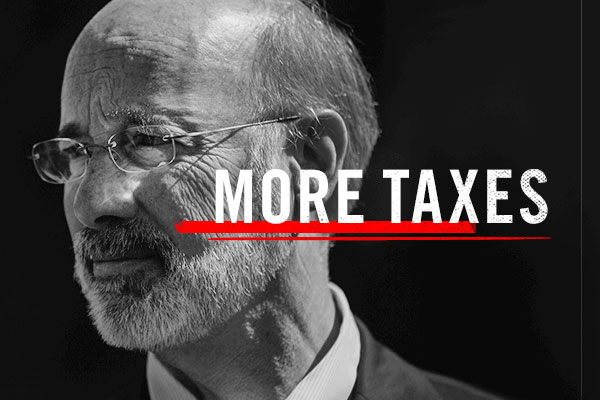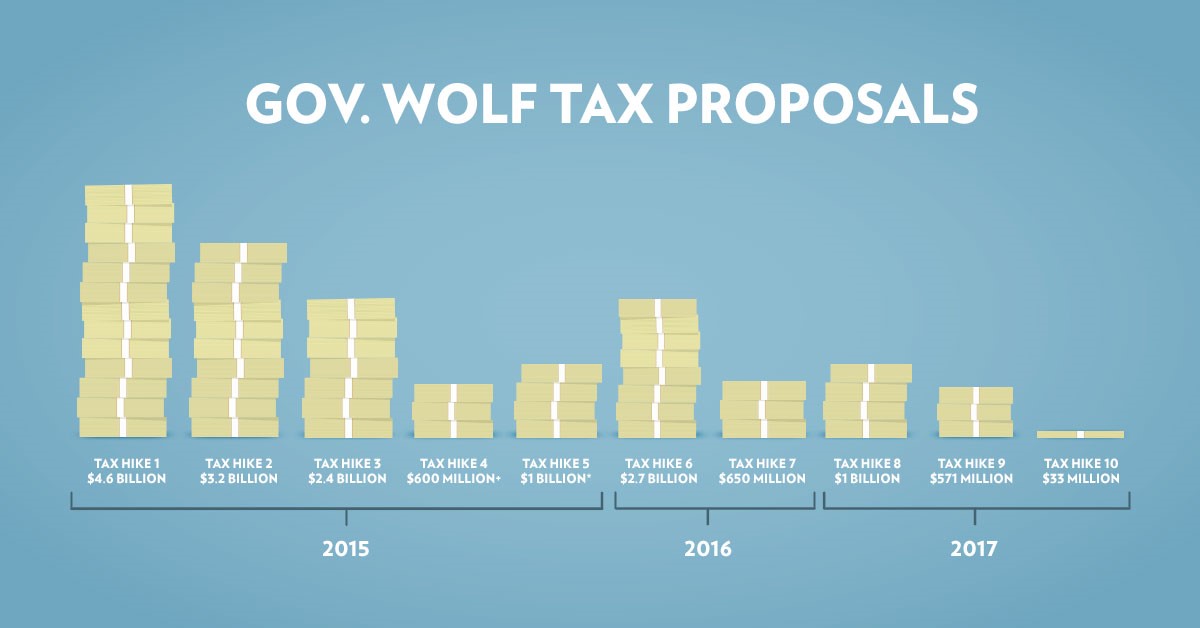Memo

A Brief History of Tom Wolf’s Tax Hike Proposals
Since taking office, Gov. Tom Wolf has proposed or supported 10 tax hikes on working families. Lawmakers worked with Wolf to raise taxes in two of the past three years.
Tax Hike Proposal #1
In his first budget address, Wolf proposed a $4.6 billion tax hike, with a net increase of $1,400 per family of four. This would have been the largest tax hike in Pennsylvania’s history, as well as larger than tax increases proposed by every other governor, combined, in 2015. Every income group would have paid higher taxes under Wolf's first plan.
This proposal was never introduced in the House—where revenue legislation is required to begin. In the Senate, however, Sen. Vince Hughes failed to attract a single cosponsor. When offered as an amendment to another bill in June 2015, this proposal received zero votes in the House.
Tax Hike Proposal #2
Wolf’s second call for new taxes came in September of 2015. This plan modified his original budget—with a smaller income tax hike, no increase in the sales tax rate, and fewer new items subject to the sales tax—to generate $3.2 billion in revenue (just over $1,000 per family of four). Legislative leaders promised Gov. Wolf a vote on this plan, and gave him time to lobby for votes.
After realizing there was little support for this plan, the governor transitioned to a third tax hike proposal.
Tax Hike Proposal #3
To gauge legislative support for tax hikes, Gov. Wolf altered his plan to include a personal income tax increase and a natural gas severance tax (on top of the current impact fee tax). This plan would have generated $2.4 billion ($744 per family of four).
The House held a vote on this proposal in October. It failed by a 73-127 count. That is, 64 percent of the House voted against this tax hike, including all Republicans and nine Democrats.
Tax Hike Proposal #4
Wolf’s fourth tax hike plan raised the sales tax rate to 7.25 percent—the second highest in the U.S.—with revenue for property tax reductions. At the same time, the plan redirected gaming revenue from property tax relief to new state spending—about a $600 million net tax increase.
This plan received little support, with strong opposition from both Democrats and Republicans.
Tax Hike Proposal #5
While the details were never publicly disclosed, Wolf’s fifth tax hike plan included a combination of imposing the sales tax on currently untaxed goods and services, raising tobacco taxes, raising taxes on banks, and a new fee on businesses just for the right to stay open.
Like all previous plans, this framework didn't generate support. Democrats requested more trade offs in order to support the sales tax increases—including raising the state minimum wage, which the Independent Fiscal Office estimates would result in 31,000 jobs lost.
Tax Hike Proposal #6
Wolf offered his sixth tax hike proposal during his 2016 budget address. The plan would have totaled $2.7 billion over a full year, which amounts to $850 per family of four. Roughly half of this increase came from raising the personal income tax rate by 11 percent. It also called for a severance tax, expansion of the sales tax, and higher tobacco taxes.
This proposal included retroactive tax increases, along with bank shares and insurance premiums taxes. That is, the higher tax rate would be effective beginning January 1, 2016, and (if passed) residents of the commonwealth would have owed additional taxes on money they had already earned. This tax proposal received no support, even from Wolf’s own party.
2016-17 Tax Hike (Enacted)
In July 2016, Wolf allowed a state budget that collected $650 million in new taxes. Although lawmakers evaded broad based taxes, they expanded the income tax on lottery winnings and approved new taxes on tobacco, e-cigarettes, digital downloads, and bank shares. This tax hike passed with 28 votes in the state Senate and 116 votes in the Pennsylvania House.
Although less destructive than Governor Wolf’s $2.7 billion proposal. The tax hike accompanied a $1.6 billion increase in spending—$204 per family of four.
Tax Hike Proposal #8
With a revenue shortfall approaching $1 billion, Wolf’s third budget address laid out yet another tax hike plan. Gov. Wolf voiced his opposition to broad-based tax hikes, yet proposed raising other taxes by more than $1 billion—$315 per family of four.
Again, Wolf sought to impose an additional tax on the natural gas industry, expand the sales tax to custom programming, design and data processing, apply a sales tax to commercial storage, and expand the tax on insurance premiums. The plan did not receive a vote in the legislature.
Tax Hike Proposal #9
In July, lawmakers facing a $2.2 billion revenue shortfall passed a $460 million increase in state spending with no plan to fund it. Wolf compromised with Senate Republicans to pitch a $571.5 million tax hike plan. At nearly $180 per family of four, the compromise was a broad-based tax increase, the very policy the governor eschewed in January.
The plan raised heating costs for about half of all Pennsylvanians by raising the gross receipts tax on natural gas, electricity, and telecommunications. It also taxed online purchases from third-party sellers, fireworks and created a 2.2 percent severance tax on natural gas production. Republicans in the House rejected the tax increase compromise
2017-18 Tax Hike (Enacted)
Eventually, Gov. Wolf and the legislature settled on borrowing $1.5 billion from the Tobacco Settlement Fund and raising taxes by $86 million this year and $160 million in 2018-19. The tax package includes a 12 percent fireworks tax, extending the sales tax to third-party online sellers, applying the personal income tax to non resident landlords and contractors, shortening the time to file tax appeals and reducing corporate income tax deductions.
Tax hikes and borrowing schemes are not the solution to Pennsylvania’s budget woes. Pennsylvania has increased taxes five times amounting to $4 billion since 2009. The IFO’s recent warning about our impending debt crisis and worker shortage makes structural reforms even more urgent.
